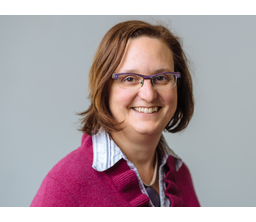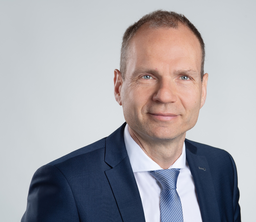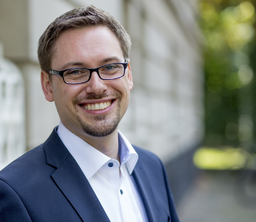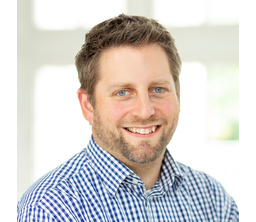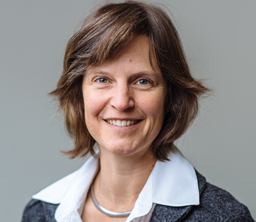Focus professorships
Less teaching, more research: Focus professorships mean more time for the in-depth study of topics defining the university's profile. Not only does this make the university stronger in research, it also allows for cross-faculty collaboration and the training of postdocs.
Jump to
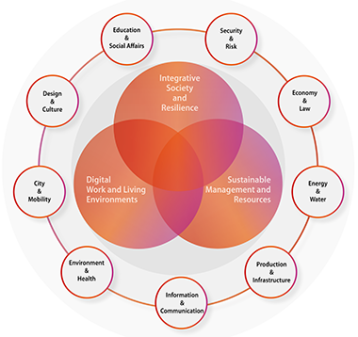 Three research areas and nine research topics serve as an umbrella for TH Köln's different research structures.
(Image: TH Köln)
Three research areas and nine research topics serve as an umbrella for TH Köln's different research structures.
(Image: TH Köln)
Focus professorships with reduced teaching load provide opportunities to develop or expand a field of research that will sustainably shape TH Köln’s profile. They also accentuate certain fields of research or tasks that usually take a back seat to teaching responsibilities. In order to attract more highly qualified researchers, TH Köln aims at achieving the successful implementation of focus professorships.
Digital work and living environments, integrative society and resilience, sustainable management and resources - these are the areas that shape the research profile of TH Köln. It is also across this spectrum that informs the four focus professorships. Their goal: making use of the practical relevance and research strength of the university's established focus disciplines.
How does this work? The reduction in teaching load that comes with a focus professorship allows for the training of young researchers and research activities. For example, existing research foci can be expanded, cross-faculty cooperation can be strengthened, and research clusters can be formed to work on profile-building topics in an interdisciplinary manner.
Four focus professorships have been established:
Prof. Dr. Andreas Behrend, Big Data Analytics – Mobility
Autonomously driving cars that park outside the city and pick people up and drop them off only when needed: This could revolutionize road traffic. The associated digitization of mobility brings with it big data that has the potential to enable a new ecosystem for personal mobility and goods transport. Part of this development: the focus professorship Big Data Analytics - Mobility.
The topic of Data-Driven Mobility is well established at TH Köln. For years, interdisciplinary expertise has been accumulating at the Faculty of Information, Media and Electrical Engineering and the Faculty of Automotive Systems and Production. Now the collaboration is being institutionalized: In the coming years, Prof. Dr. Andreas Behrend will focus his research on the interface of data and mobility.
If vehicles are to participate in traffic as autonomous, adaptive and social agents in the future, they will have to share data not only with each other but also with the infrastructure. Big Data Analytics methods can be used to employ this data in analyzing scenarios, generating models and ultimately making decisions. This makes it possible, for example, to optimize mobility times, the utilization of transport routes and means, energy requirements or CO2 footprints.
Prof. Dr. Philipp Schaer, Data science
Digital science is not just computer science, information science, data science or statistics, but an interaction of the various disciplines. Accordingly, the focus professorship Data Science is set up to beinterdisciplinary.
More and more data is being collected all over the world – digitization, the Internet and new technologies make it possible. Large amounts of data are also playing an increasingly important role in all disciplines at TH Köln. This development is taken into account by the focus professorship Data Science, which is located at the interface of the Faculty of Information Science and Communication Studies and the Faculty of Computer Science and Engineering Science. Thus, on the one hand, it brings together existing competencies from the fields of Data Science, Artificial Intelligence and Information Retrieval and, on the other hand, explores new approaches from the fields of Scientometrics, Web Science, Open Science Data, Computational Social Sciences and Knowledge Discovery.
Tying these loose ends together is focus professor Prof. Dr. Philipp Schaer from the Faculty of Information Science and Communication Studies. He is mainly concerned with the search for information, i.e. how structured data, for example in library catalogs or databases, but also unstructured web data can best be made accessible to users. To this end, his research group applies methods from the fields of artificial intelligence, natural language processing and machine learning. Results from this research flow directly into existing and future courses – also through the postdocs assigned to the focus professorship, who are deliberately involved in teaching and can thus bring students directly into contact with the latest developments in research.
Prof. Dr. Christian Wolf, Circular Transformation
Circular transformation - or recycling - seems simple at first: waste and residual materials are processed in such a way that they can be returned to the production cycle. However, it is generally less well known that, in addition to technological requirements, ecology, economy, sociology and legal framework conditions must also be taken into account.
This holistic approach to circular transformation is firmly established at TH Köln. Anchored in the research profile as "Sustainable Management and Resources", the subject area links institutes from technology, ecology, economics and sociology across faculties. Faculties, institutes and professors at TH Köln have been developing innovative ideas, novel processes and procedures for years.
The focus professorship Circular Transformation is a continuation of this cooperation. Chair Prof. Dr. Christian Wolf draws on experience at the :metabolon teaching and research center and in the Circular Transformation Lab research cluster - an ideal basis for designing a new methodological approach to developing sustainable innovations and applying it in practice in research and teaching.
Prof. Dr. Isabel Zorn, Digitalization and social transformation
Digital media have fundamentally changed the way people communicate. This process was accelerated by the Corona pandemic. In her focus professorship, Prof. Dr. Isabel Zorn is researching what needs to be considered in this development.
On the one hand, digitally designed processes open up new opportunities for participation. On the other hand, they exclude groups of people who lack digital skills or whose needs have been insufficiently modeled. A successful transformation therefore requires both: computer science, which designs digital communication possibilities, and the social sciences, which analyze communication and action processes. This interdisciplinary interaction also characterizes the focus professorship Digitalization and Social Transformation.
Located between the Faculty of Computer Science and Engineering Science and the Faculty of Applied Social Sciences and within the research focus DITES – Digital Technologies and Social Services, the focus professorship sheds light on the analysis and design of social innovations through digitization processes. A particular focus is on addressing key societal challenges, for example health and well-being in demographic change or security, participation and social cohesion in societal change. Methodologically, the main focus is on the development of empirical, but also technology and design-based approaches for a socially oriented design of digital technologies, for example by investigating how clients in social work use digital tools.

